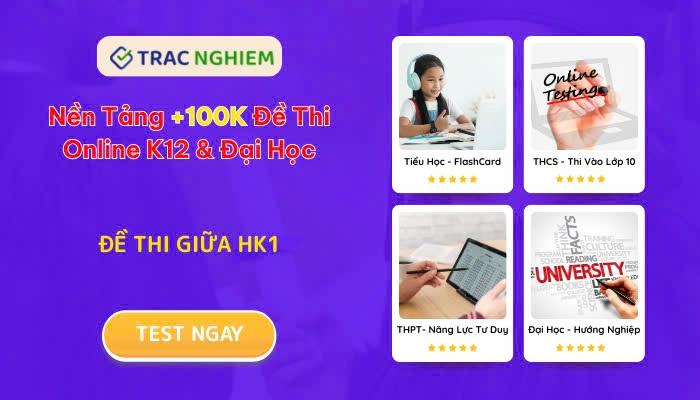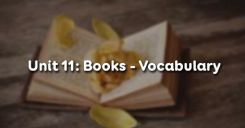Bài học Unit 11 Book phần Reading truyền tải kiến thức về lợi ích của sách. Qua đó giúp các em rèn luyện các kỹ năng đọc hiểu đã được học để nắm bắt thông tin cần thiết trong bài.
Tóm tắt bài
1. Before You Read Unit 11 Lớp 12
Work in pairs. Ask each other the following questions.
(Làm việc theo cặp. Hỏi những câu hỏi sau.)
- Do you often read books? (Bạn có thường đọc sách không?)
- What kind of books do you enjoy reading most/least? (Loại sách nào bạn thích/không thích đọc nhất?)
- How do you read books? (Bạn đọc sách như thế nào?)
Guide to answer
- Yes. I do.
- I enjoy reading books on science most, but I read novels least.
- I often read my favourite books in my free time; but when I, by chance, get an interesting book I find time to read it.
In reading books, I generally scan its content first lo see if there are any interesting ideas. Then if I have more time, I read the preface. If I have few time, I read a few pages.
2. While You Read Unit 11 Lớp 12
Read the text and do the tasks that follow.
(Đọc đoạn văn và làm các bài tập bên dưới)
2.1. Unit 11 Reading Task 1
The following words and phrases all appear in the passage. Find the Vietnamese equivalent for each of them.
(Tất cả những từ và cụm từ sau đều xuất hiện trong bài. Tìm từ tiếng Việt có nghĩa tương đương với mỗi từ đó.)
- swallow:___________________
- dip into: ___________________
- taste: _____________________
- “hard-to-pick-up again":_______
- digest: ____________________
- chew: _____________________
- “hard-to-put-down": __________
Guide to answer
- swallow: nuốt (đọc ngấu nghiến)
- dip into: chấm vào (đọc qua loa)
- taste: nếm (đọc thử)
- “hard-to-pick-up again": không thể đọc lần nữa.
- digest: tiêu hóa (đọc và suy nghĩ)
- chew: nhai (nghiền ngẫm)
- “hard-to-put-down": không thể bỏ xuống
2.2. Unit 11 Reading Task 2
Work in pairs. Decide whether the statements are-true (T) or false (F), or not mentioned (NM) in the reading passage. Tick (V) the appropriate box.
(Làm việc theo cặp. Xác định những câu nói là đúng (T) hay sai (F) hoặc không được đề cập đến (NM) ở bài đọc. Ghi dấu (V) khung thích hợp.)
- You can't read different types of books in the same way. (Bạn không thể đọc các loại sách khác nhau theo cùng một kiểu.)
- When you "taste" a book you read it carefully from the beginning to the end. (Khi bạn đọc thử một quyển sách, bạn đọc nó cẩn thận từ đầu đến cuối.)
- Many people only have time to read when they are travelling. (Nhiều người chỉ có thời gian đọc sách khi họ đi du lịch.)
- Books with good stories are often described as "hard-to-put-down". (Những quyển sách có nội dung hay thường được mô tả là "không thể bỏ xuống được")
- Television has replaced books altogether. (Tivi cùng lúc thay thế được cho sách)
Guide to answer
- You can't read different types of books in the same way. (NM)
- When you "taste" a book you read it carefully from the beginning to the end. (F) ---> It is enough to dip into and read bits here and there.
- Many people only have time to read when they are travelling. (NM)
- Books with good stories are often described as "hard-to-put-down". (T)
- Television has replaced books altogether. (F) ---> In fact, television has not killed reading.
2.3. Unit 11 Reading Task 3
Answer the questions according to the information in the passage.
(Trả lời câu hỏi theo thông tin ở đoạn văn.)
- How many ways of reading are there? (Có bao nhiêu cách đọc sách?)
- When might you "swallow" a book? (Khi nào bạn "đọc ngấu nghiến" một quyển sách?)
- What should you do before starting to read a book carefully and slowly? (Bạn nên làm giờ trước khi bắt đầu đọc một quyển sách kỹ lưỡng và chậm rãi?)
- What are the advantages of television over books? (Những lợi ích của truyền hình so với sách là gì?
- What are the advantages of books over television? (Những lợi ích của sách so với truyền hình là gì?)
Guide to answer
- There are three.
- When you find a good story and have time to enjoy it.
- Read a few pages to see if it's the one you can read and understand it easily. Check that it is not too difficult.
- Televisions can bring you the information and stories with colour pictures and actions.
- Books are still a cheap way to get information and entertainment. And moreover you can keep a book forever and read it at any time and again and again.
3. After You Read Unit 11 Lớp 12
Work in pairs or groups. Find the names of types of books in the square. The words may go across, down, up, backwards, or at an angle . Here are some clues...
(Làm việc theo cặp hoặc nhóm. Tìm ra tên của các loại sách trong hình vuông. Các từ có thể theo hàng ngang đi xuống đi lên lui hay ở góc. Sau đây một vài ý tưởng.)
a. If you like books with an exciting story especially ones about crime or spies, read a t…..
b. If you enjoy reading stories about love affairs, a r…………….is the right book for you.
c. A n…………… is a story long enough to fill a complete book, in which the characters and events are usually imaginary.
d. A s………………fiction book is a type of book that is based on imagined scientific discoveries of the future.
e. If you want to learn how to knit or work with wood, you should buy a c…………… book.
f. F…………….books tell stories from the author’s imagination.
g. A c………………book tells stories through pictures.
h. A b……………….is about a person’s life written by somebody else.
| A | A | B | H | F | L | E |
| S | C | I | E | N | C | E |
| L | E | V | O | N | R | B |
| F | B | J | A | M | X | Z |
| K | I | M | J | T | W | C |
| G | O | C | B | H | S | T |
| R | G | R | T | R | Q | E |
| V | R | A | J | I | C | A |
| C | A | F | V | L | O | J |
| W | P | T | Q | L | M | N |
| S | H | S | W | E | I | F |
| G | Y | W | R | R | C | V |
| D | R | T | K | Y | F | U |
Guide to answer
a. thriller b. romance c. novel d. science
e. craft f. fiction g. comic h. biography
4. Phần dịch Reading Unit 11 Lớp 12
Về vấn đề đọc sách, Francis Bacon, người cùng thời với Shakespeare, đã viết câu này: "Một số sách là để đọc qua loa, số khác để đọc ngấu nghiến và một vài quyển để đọc và suy ngẫm." Lời khuyên đúng đắn này cho thấy có thể đọc nhiều loại sách khác nhau theo nhiều kiểu khác nhau như thế nào. Thí dụ, bạn có thể cầm một quyển sách về du lịch lên rồi đọc một vài trang trước khi ngủ. Chỉ cần xem lướt qua quyển sách và đọc chỗ này một chút chỗ kia một chút là đủ. Nói ngắn gọn, đó là "đọc qua loa".
Một vài truyện là để "đọc ngấu nghiến". Hãy tưởng tượng bạn tìm được một quyển truyện hay và quan trọng hơn, bạn có thời gian để đọc quyển truyện ấy. Bạn có thể đang đi nghỉ, hoặc đang ngồi trên chiếc xe lửa đường dài. Nếu đó là một quyển sách hay, bạn có thể nói: "Quyển sách ấy hay đến nỗi tôi không thể đặt nó xuống." Nhưng không phải tất cả truyện đều thuộc loại này. Các nhà phê bình đôi khi miêu tả sách là "không thể đặt xuống", hoặc "khó có thể cầm lên lại".
Những quyển sách khác dành để đọc chậm và kỹ. Nếu đó là quyển sách về đề tài mà bạn thích, bạn sẽ muốn "đọc và nghiền ngẫm" nó. Điều đó không có nghĩa là đọc thật chậm. Khi lần đầu tiên bạn cầm quyển sách lên, hãy kiểm tra xem sách có quá khó đọc hay không. Đừng bắt đầu đọc một quyển sách nếu ngày từ những trang đầu bạn thấy rằng đó không phải là quyển sách dễ đọc và dễ hiểu.
Một số người cho rằng ngày càng nhiều người có tivi trong nhà thì càng ít người mua sách để đọc. Tại sao phải đọc khi mà tivi có thể mang lại cho bạn tất cả các thông tin và câu chuyện đầy màu sắc, hình ảnh và hành động? Nhưng, thực ra, tivi không giết chết việc đọc sách. Ngày nay, có đủ mọi loại sách được bày bán hơn trước. Sách vẫn là cách tìm thông tin và giải trí ít tốn kém, và bạn có thể giữ mãi một cuối sách và đọc nó nhiều lần. Sách trong nhà là một nguồn cung cấp kiến thức và nguồn vui tuyệt vời.
Bài tập minh họa
Read the passage carefully and choose the correct answer.
Reading, as you know, is a continuous and never ending process. If you do very little reading, or if you read only material that offers no challenge to your comprehension, your reading will be of very little use. Once we reach a certain age, or once our formal schooling is completed, many of us become so restricted in our choice of .reading that we rarely read any new type of reading experience. We tend to read only books in our professional or business field, or only inspirational books, or only our favorite newspapers every morning, or only one magazine for which we have developed a preference. And the trouble starts here. You should neither read only for entertainment nor only for information but you should also read for intellectual growth, for mental stimulation, for enriching your background of knowledge, for wisdom, and for broader outlook and mature understanding. What kind of books should you read to continue your intellectual growth, to gain a background for opinion and for judgment? The answer is simple one: Read books in fields you have little or no acquaintance with, books that will open for you new horizons of learning, books that will help you explore new areas of knowledge and experience, books that will make the world and people more understandable to you. Sadly, more and more people today are giving up the printed word in favor of being entertained and informed by watching TV, a popular entertainment ,device present at almost homes. More and more children are being subjected to TV programming, perhaps as a babysitter. More than two hours of TV time per day are now a part of children development, generating physiological and mental problems that are of growing concern among experts.
1. Reading ________.
a. completely stops when we finish our schooling c. is of little use
b. is an endless process d. should be done a little
2. According to the text, ________.
a. new type of reading experience often interests most of us .
b. we should only read for entertainment
c. reading for intellectual growth is necessary
d. we should not read for mental stimulation
3. What kind of books is recommended?
a. Books in fields you have little or no acquaintance with
b. Books that will help you explore new areas of knowledge and experience
c. Books that will open for you new horizons of learning
d. All are correct
4. We can learn from the text that today ________.
a. people spend more time watching TV than reading books
b. more and more people enjoy reading
c. most babysitters prefer watching TV
d. most children spend less than 2 hours a day watching TV
5. The writer ________.
a. does not approve of reading process c. prefers watching TV to reading
b. advises us to read as little as possible d. appreciates reading
Key
| 1 | 2 | 3 | 4 | 5 |
| B | C | D | A | D |
Bài tập trắc nghiệm Reading Unit 11 Lớp 12
Như vậy là các em đã xem qua bài giảng phần Reading Unit 11 Books chương trình Tiếng Anh lớp 12 về chủ đề sách. Để phát triển kỹ năng đọc hiểu về đề tài các loại sách mời các em tham gia thực hành Trắc nghiệm Unit 11 lớp 12 Reading.
-
Câu 1:
(1) _________
- A. brain
- B. heart
- C. forehead
- D. hand
-
Câu 2:
(2) _________
- A. imagine
- B. imaginative
- C. imaginary
- D. imagination
-
Câu 3:
(3) _________
- A. one another
- B. other
- C. together
- D. each other
Câu 4-10: Mời các em đăng nhập xem tiếp nội dung và thi thử Online để củng cố kiến thức về bài học này nhé!
Hỏi đáp Reading Unit 11 Lớp 12
Trong quá trình học tập nếu có thắc mắc hay cần trợ giúp gì thì các em hãy comment ở mục Hỏi đáp, Cộng đồng Tiếng Anh HOC247 sẽ hỗ trợ cho các em một cách nhanh chóng! Sau bài học Reading này các em chuyển qua bài học mới Unit 11 Books - Speaking kế tiếp. Chúc các em học tốt!
-- Mod Tiếng Anh 12 HỌC247










